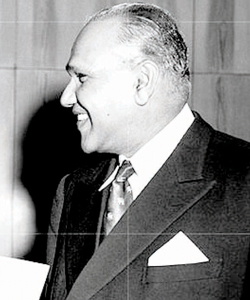The current international order emerged after the Second World War, established around the consensus that the allied world powers, through the United Nations system, primarily aimed to preserve global peace. However, this system has always been dominated by powerful states. Initially, the Global North held the highest positions and significant influence within the UN.
Despite the post-colonial challenges Sri Lanka faced, its active participation in the international system deserves recognition and praise. Highly respected positions held by distinguished Sri Lankans in the UN system such as Justice Weeramantry in the International Court of Justice, Shirley Amarasinghe in International Law of Sea Conference and Jayantha Dhanapala as UN Under Secretary General, embellished Sri Lanka’s name in global politics.

Sir RSS Gunewardene
Yet, Sri Lanka’s admittance to the UN system was filled with a haphazard path at the outset as the country encountered staunch Soviet opposition, which prolonged the young nation’s aspiration to enter the portals of the elite club causing constant grievances to D. S. Senanayake’s Government known for its pro-British policy under all weather.
Sri Lanka achieved its goal of becoming a member state of the United Nations in 1955. Reflecting on the country’s entry to the UN system after seventy years, it is evident that one man played a pivotal role in navigating the challenging corridors of Manhattan to accomplish what once seemed impossible. That man was Sir R.S.S. Gunewardene, the first Sri Lankan Permanent Representative to the UN.
Grit of RSS
Gunewardene was ahead of his time, employing unconventional, yet effective methods to achieve his goals. When he was appointed by Sir John Kotelawala as Ceylon’s Ambassador to the United States in 1954, he faced a significant challenge: Ceylon had no legal standing in the United Nations as it was not a member State. However, Gunewardene was empowered by his diplomatic status, which allowed him to interact freely with UN officials in New York.
Gunewardene understood a reality that the leaders of the United National Party (UNP) failed to comprehend due to their blind faith in the British. While Kotelawala’s Government sought support from Britain, the geopolitical landscape of the time, shaped by the Cold War, dictated a different course. The British did not support Sri Lanka’s bid for UN membership, and the Soviet Union consistently vetoed the application, arguing that Sri Lanka could not claim full sovereignty due to the ongoing British presence in Trincomalee and Katunayake.
The issue of granting UN membership to Sri Lanka resonated deeply with the tensions of the Cold War, and Britain was cautious in its dealings. Therefore, Gunewardene faced an immense challenge in negotiating with global powers to open the doors of the United Nations to his nation.
During his early days as Ceylon’s Ambassador to the USA, RSS initiated a dialogue informally with then-UN Secretary-General Marshall. Contrary to what UNP leaders advocated for in Colombo by propagating a Communist phobia, RSS forged ties with the diplomats from the Iron Curtain as a quintessential moment displaying his realistic worldview that finally brought good results.
Admiring his resilience in achieving UN membership for his country, the Bulgarian representative in the UN asked RSS to consider the possibility of becoming an Observer State prior to achieving the fullest membership. Yet, RSS’s pride rejected such a petty proposal as he truly believed in Sri Lanka’s position as a full member of the United Nations.
After considering the practical implications, RSS finally compelled Prime Minister Sir John to accept the Observant Status in early 1955. In the same year, RSS logically convinced the leading States in the UN that Sri Lanka was not a British acolyte arguing it was Sri Lanka that recognised People’s Republic of China after Great Britain in 1949.
Diplomatic tug-of-war
Amid the efforts made by RSS to fulfill his objectives, global powers were engaged in a diplomatic tug-of-war over granting UN membership status to 18 States, including Sri Lanka. Among the applicants for UN membership was Mongolia, and many Western countries were reluctant to admit Communist Mongolia, which adversely affected Sri Lanka. The Soviets continued to block Sri Lanka’s attempts to join the UN in a tit-for-tat manner.
This period was particularly challenging for RSS, as he had to navigate Sri Lanka’s position against the backdrop of the emerging Cold War realities. He even held discussions with the Soviet representative at the UN, Molotov, but to no avail. Following the recommendations of Esmond Wickremasinghe, RSS sought to befriend the legendary Indian Permanent Representative Krishna Menon in hopes that India would support Sri Lanka’s aspiration to become a permanent member State of the UN.
However, Krishna Menon often avoided meeting RSS. When they finally encountered each other in the lobby of the UN headquarters, Menon, known for his sarcasm, remarked, “RSS, why don’t you fly back home? This won’t work at all!” Irked by Menon’s cynical comments, RSS responded with a harsh lambasting, surpassing all norms of diplomatic etiquette.
At the zenith of this laborious task, RSS finally met one influential member from the Soviet Communist Party in 1955 summer in Geneva.
Impressed by RSS’s candid attempt to get UN membership to his country, this influential Soviet delegate promised not to thwart the next attempt at Sri Lanka’s entry to the UN at the Security Council. Soviets kept their word when they voted in favour of Sri Lanka’s admittance to the UN in December 1955 and they voted in favour of all the country’s applications.
Sri Lanka was finally admitted to the August forum of the United Nations on December 14 in 1955 when RSS stepped into the house with a standing ovation from the other representatives. Sir R. S. S. Gunewardene became the country’s first permanent representative in the UN which he held for several years. His erudition as a jurist in some international situations such as the Suez crisis and the Hungarian problem in 1956 elevated the status of Sri Lanka globally.







